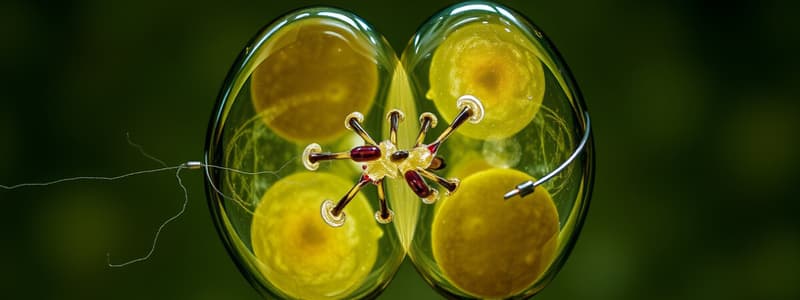Podcast
Questions and Answers
What process is involved in the production of gametes?
What process is involved in the production of gametes?
- Mitosis
- Meiosis (correct)
- Binary Fission
- Fragmentation
What type of cell division is involved in growth and repair?
What type of cell division is involved in growth and repair?
- Meiosis
- Budding
- Fragmentation
- Mitosis (correct)
Meiosis promotes genetic variation in organisms.
Meiosis promotes genetic variation in organisms.
True (A)
Mitosis consists of two nuclear divisions.
Mitosis consists of two nuclear divisions.
Mitosis produces daughter cells that are genetically identical.
Mitosis produces daughter cells that are genetically identical.
Meiosis involves two sets of nuclear divisions.
Meiosis involves two sets of nuclear divisions.
Meiosis produces daughter cells that are not identical.
Meiosis produces daughter cells that are not identical.
Which process involves the synapsis of homologous chromosomes?
Which process involves the synapsis of homologous chromosomes?
Mitosis occurs during asexual reproduction.
Mitosis occurs during asexual reproduction.
Meiosis results in four haploid gametes.
Meiosis results in four haploid gametes.
What is another name for meiosis?
What is another name for meiosis?
What happens during A1 of meiosis?
What happens during A1 of meiosis?
During M2, where do chromosomes align?
During M2, where do chromosomes align?
What occurs during A2?
What occurs during A2?
What happens during T2?
What happens during T2?
What is formed during T1?
What is formed during T1?
Interphase indicates the cell is not undergoing meiosis.
Interphase indicates the cell is not undergoing meiosis.
During Prophase one, what occurs?
During Prophase one, what occurs?
What marks prophase I or II?
What marks prophase I or II?
What occurs during M1?
What occurs during M1?
What happens at T1?
What happens at T1?
During ____________, centrioles replicate.
During ____________, centrioles replicate.
In prophase one or two, the stage is referred to as ____________.
In prophase one or two, the stage is referred to as ____________.
What occurs during T1 or T2?
What occurs during T1 or T2?
In M1, what stage comes before anaphase two?
In M1, what stage comes before anaphase two?
What stage occurs after prophase one?
What stage occurs after prophase one?
Flashcards
Meiosis
Meiosis
The process of cell division that produces four haploid gametes (sex cells) from a single diploid cell.
Gametes
Gametes
Sex cells that contain half the number of chromosomes as a normal body cell.
Diploid
Diploid
Having two sets of chromosomes, one from each parent.
Haploid
Haploid
Signup and view all the flashcards
Mitosis
Mitosis
Signup and view all the flashcards
Crossing Over
Crossing Over
Signup and view all the flashcards
Independent Assortment
Independent Assortment
Signup and view all the flashcards
Synapsis
Synapsis
Signup and view all the flashcards
Homologous Chromosomes
Homologous Chromosomes
Signup and view all the flashcards
Prophase I
Prophase I
Signup and view all the flashcards
Metaphase I
Metaphase I
Signup and view all the flashcards
Anaphase I
Anaphase I
Signup and view all the flashcards
Telophase I
Telophase I
Signup and view all the flashcards
Prophase II
Prophase II
Signup and view all the flashcards
Metaphase II
Metaphase II
Signup and view all the flashcards
Anaphase II
Anaphase II
Signup and view all the flashcards
Telophase II
Telophase II
Signup and view all the flashcards
Reduction Division
Reduction Division
Signup and view all the flashcards
Interphase
Interphase
Signup and view all the flashcards
Prophase I
Prophase I
Signup and view all the flashcards
Crossing Over
Crossing Over
Signup and view all the flashcards
Independent Assortment
Independent Assortment
Signup and view all the flashcards
Gametes
Gametes
Signup and view all the flashcards
Zygote
Zygote
Signup and view all the flashcards
Recombination
Recombination
Signup and view all the flashcards
Monogenic Trait
Monogenic Trait
Signup and view all the flashcards
Study Notes
Meiosis Overview
- Meiosis is the process that produces gametes, essential for sexual reproduction.
- Involves two rounds of nuclear division, resulting in four haploid gametes.
- Promotes genetic variation through processes such as crossing over and independent assortment of chromosomes.
Comparison with Mitosis
- Mitosis involves one nuclear division, resulting in two genetically identical daughter cells.
- Mitosis is primarily for growth and repair, occurring during asexual reproduction.
- In meiosis, daughter cells are not genetically identical due to recombination and separation of homologous chromosomes.
Key Stages of Meiosis
-
Prophase I: Homologous chromosomes pair up (synapsis) and crossing over occurs, enhancing genetic diversity.
-
Metaphase I: Tetrads align at the equator of the cell.
-
Anaphase I: Homologous chromosomes separate and move to opposite poles.
-
Telophase I: Cells divide, resulting in two haploid cells, each with duplicated chromosomes.
-
Prophase II: Chromosomes (not tetrads) align at the equator again in the two haploid cells.
-
Metaphase II: Sister chromatids line up at the equatorial plane.
-
Anaphase II: Sister chromatids separate and move to opposite poles.
-
Telophase II: Four haploid gametes are formed, each containing half the original chromosome number.
Specific Definitions
- Reduction division: Another term for meiosis due to the halving of chromosome numbers.
- Synapsis: The pairing of homologous chromosomes during Prophase I, facilitating genetic recombination.
- Homologous chromosomes: Chromosomes that are similar in shape, size, and genetic content, participating in crossing over during meiosis.
Important Phases and Features
- Interphase: Not part of meiosis; the cell prepares for division, and DNA replicates, centrioles replicate during this phase.
- Crossing over: Critical process that occurs in Prophase I, where segments of DNA are exchanged between homologous chromosomes, increasing genetic variation.
- Longest phase of meiosis occurs in Prophase I, allowing extensive genetic interaction among chromatids.
Other Notable Points
- Meiosis is essential not only for producing gametes but also for ensuring genetic diversity in sexually reproducing populations.
- Each stage of meiosis has distinct characteristics that contribute to the formation of diverse genetic combinations.
Studying That Suits You
Use AI to generate personalized quizzes and flashcards to suit your learning preferences.



